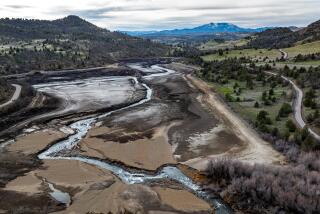Ishi’s Brain to Be Returned to Tribe’s Descendants
- Share via
SAN FRANCISCO — The Smithsonian Institution announced Friday that it will return the brain of Ishi, California’s most famous Native American, but not to the Butte County tribes who have campaigned to reunite his remains and rebury them in his homeland in Tehama County.
The museum says it will instead give the brain to Native Americans descended from the Yana, the larger tribe to which Ishi’s people, the Yahi, belonged. A spokesman said the museum found Yana descendants in the Shasta County towns of Redding and Burney.
Ishi, the last known Yahi, staggered from his wilderness hide-out into Oroville in 1911, about five years after the last of his people had been wiped out by disease, starvation and bounty hunters. He became a living exhibit at the Phoebe Hearst Museum of Anthropology at UC Berkeley, where he lived until his death of tuberculosis in 1916.
Books, movies and plays have been written about Ishi, and he has been studied by generations of California schoolchildren as a symbol of the depradation of Native American tribes in California.
Ishi’s body was cremated and his ashes were sent to a Colma cemetery, where they remain. But Ishi’s friend, anthropologist Alfred Kroeber, sent his brain to the Smithsonian.
Robert Fri, director of the National Museum of Natural History, said in a statement that “the Smithsonian Institution recognizes that all California Native Americans feel a powerful connection with Ishi and a responsibility to see that his remains are united and given a proper burial. However, we were guided by the moral and legal obligation to find out whether any of Ishi’s descendants were still alive.”
Mickey Gemmill, a Yana descendant and spokesman for the Redding Rancheria, said he learned of the Smithsonian’s decision late Friday afternoon.
“We are surprised,” Gemmill said. “The Smithsonian has made a decision that we are the closest relatives. We knew that all along, but we supported the Butte County tribes’ efforts.”
Gemmill said the tribes will have to consult before deciding what to do next. He could not say when or how they might take delivery of the brain or what they might do with it.
Art Angle, a Native American from Oroville, launched a search for Ishi’s remains in 1997. He was told by UC Berkeley and UC San Francisco that they did not know where the brain might be. Angle could not be reached for comment Friday.
Spurred by a Los Angeles Times story about Angle’s search for Ishi’s brain, Duke University anthropologist Orin Starn and UC San Francisco historian Nancy Rockefellar launched a fresh search through historical records. In December, Starn, who is writing a book about Ishi, discovered correspondence at a UC Berkeley library between Kroeber and the Smithsonian that showed the brain had been sent to the national museum.
In January, the Smithsonian confirmed to Starn that it had Ishi’s brain. California lawmakers began bombarding the museum with letters, urging it to quickly return the brain to California. On April 6, the state Assembly held a special hearing on the matter, in which Smithsonian officials were again urged to act quickly.
“I’m relieved and very happy that Ishi’s brain is finally coming home,” Assemblyman Darrell Steinberg (D-Sacramento) said Friday. “Without the Legislature’s intervention, there is no doubt in my mind that Ishi’s brain would have remained in the Smithsonian’s warehouse for another 80 years.”
Federal law requires that Native American remains should be returned to federally recognized, culturally affiliated tribes. Smithsonian officials said Friday that their decision follows the letter and the spirit of the law.
The Butte County tribes which campaigned for the return of Ishi’s remains could prove no cultural affiliation to Ishi. Angle said that he had heard stories of Ishi all his life and simply wanted to do what he could to put the man’s spirit to rest by reuniting his remains and burying them.
Spokesmen for the Pit River tribe in Burney could not be reached for comment Friday.
More to Read
Sign up for Essential California
The most important California stories and recommendations in your inbox every morning.
You may occasionally receive promotional content from the Los Angeles Times.













